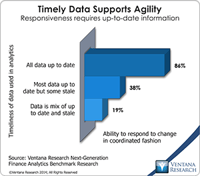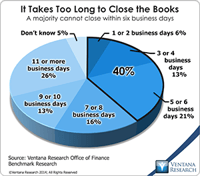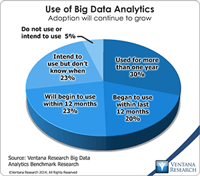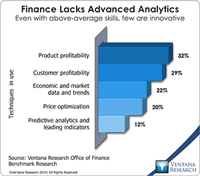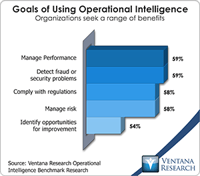Digital transformation of the Office of Finance has been a recurring theme for several years, but adoption accelerated when offices were locked down and organizations had to collaborate remotely. It involves shifting manual work, often completed via spreadsheets circulating in emails, to software and systems for improved performance.
Read More
Topics:
Performance Management,
Office of Finance,
Digital transformation,
Digital Business,
digital finance
Ventana Research defines financial performance management (FPM) as the process of addressing often overlapping issues involving people, process, information and technology that affect how well finance organizations operate and support the activities of the rest of their organization. FPM software supports and automates the full cycle of finance department activities, which include planning and budgeting, analysis, assessment and review, closing and consolidation, internal financial reporting...
Read More
Topics:
Performance Management,
ERP,
FP&A,
Human Capital Management,
Office of Finance,
Consolidation,
Financial Performance Management,
FPM
The annual Oracle OpenWorld user group meeting provides an opportunity to step back and take a longer view of business, industry and technology trends affecting the company. Last year, after listening to Larry Ellison’s and Mark Hurd’s vision for the future of IT, I wrote that Oracle had to continue shifting its focus to business applications because the accelerating shift to cloud computing would lead corporations to outsource their IT infrastructures, services and security to third parties....
Read More
Topics:
Big Data,
Performance Management,
SaaS,
ERP,
Office of Finance,
Analytics,
Cloud Computing,
PaaS,
Digital Technology
The ERP market is set to undergo a significant transformation over the next five years. At the heart of this transformation is the decade-long evolution of a set of technologies that are enabling a major shift in the design of ERP systems – the most significant change since the introduction of client/server systems in the 1990s. Some ERP software vendors increasingly are utilizing in-memory computing, mobility, in-context collaboration and user interface design to differentiate their...
Read More
Topics:
Performance Management,
ERP,
FP&A,
Office of Finance,
Reporting,
Consolidation,
Human Capital,
Business Analytics,
Uncategorized,
Business Performance Management (BPM),
Financial Performance Management (FPM),
Financial Performance Management,
FPM
The theme of transforming the finance organization is hot again. The term “finance transformation” refers to the longstanding objective of shifting the focus of finance departments from transaction processing to more strategic activities such as providing the rest of the organization with forward-looking analysis. I focus on the technology and data aspects of this type of business issue in these analyst perspectives because they are usually essential to achieving some business objective....
Read More
Topics:
Performance Management,
continuous improvement,
Controller,
Analytics,
Business Performance Management (BPM),
CFO,
Financial Performance Management (FPM)
Optimization is the application of algorithms to sets of data to guide executives and managers in making the best decisions. It’s a trending topic because using optimization technologies and techniques to better manage a variety of day-to-day business issues is becoming easier. I expect optimization, once the preserve of data scientists and operations research specialists will become mainstream in general purpose business analytics over the next five years.
Read More
Topics:
Big Data,
Performance Management,
Social Media,
Operational Performance Management (OPM),
Analytics,
Business Analytics,
Business Collaboration,
Business Performance Management (BPM),
Customer Performance Management (CPM),
Financial Performance Management (FPM),
Information Management (IM),
Sales Performance Management (SPM),
Supply Chain Performance Management (SCPM),
Price Optimization
Managing prices has always been an activity of keen interest to businesses, but it has become even more critical to do it well. Over the past decade many companies have found their ability to raise prices has been constrained by intense competition resulting from Internet commerce, global competition and other factors. One tool for dealing with this pressure is price and revenue optimization (PRO), an analytic methodology that calculates how demand varies at different price levels and then uses...
Read More
Topics:
Big Data,
Performance Management,
Predictive Analytics,
Sales,
Office of Finance,
Operational Performance Management (OPM),
Analytics,
Business Analytics,
Business Performance Management (BPM),
Financial Performance Management (FPM),
Sales Performance Management (SPM),
analytical application,
Price Optimization
SYSPRO is a 35-year-old ERP vendor that focuses on products for midsize companies, particularly those in manufacturing and distribution. In manufacturing, SYSPRO supports make, configure and assemble, engineer to order, make to stock and job shop environments. The company attempts to differentiate itself through vertical specialization and its years of ongoing development, which can reduce the need for customization and cut the cost of initial and ongoing configuration to suit the needs of...
Read More
Topics:
Performance Management,
ERP,
Human Capital Management,
Office of Finance,
Operational Performance Management (OPM),
Reporting,
cloud ERP,
container,
Analytics,
Business Analytics,
Cloud Computing,
Collaboration,
Dashboards,
Business Performance Management (BPM),
Financial Performance Management (FPM),
Supply Chain,
Supply Chain Performance Management (SCPM),
SCM,
S&OP,
Digital Technology
Financial management software provider Intacct recently held its seventh annual user conference. In addition to a long list of enhancements in current and upcoming product releases, the company used the occasion to announce Intacct Collaborate, a capability built into its software that enables finance and accounting organizations to work together to answer questions or resolve issues while performing a process. Our benchmark research shows that collaboration ranks second in importance behind...
Read More
Topics:
Performance Management,
Salesforce.com,
ERP,
Human Capital Management,
NetSuite,
Office of Finance,
Reporting,
cloud ERP,
Analytics,
Business Analytics,
Business Collaboration,
Chatter,
Cloud Computing,
Collaboration,
Dashboards,
Business Performance Management (BPM),
Financial Performance Management (FPM),
FinancialForce,
Sales Performance Management (SPM),
Intacct
Financial management software provider Intacct recently held its fourth annual user conference. In addition to a long list of enhancements in current and upcoming product releases, the company used the occasion to announce Intacct Collaborate, a capability built into its software that enables finance and accounting organizations to work together to answer questions or resolve issues while performing a process. Our benchmark research shows that collaboration ranks second in importance behind...
Read More
Topics:
Performance Management,
Salesforce.com,
ERP,
Human Capital Management,
NetSuite,
Office of Finance,
Reporting,
cloud ERP,
Analytics,
Business Analytics,
Business Collaboration,
Chatter,
Cloud Computing,
Collaboration,
Dashboards,
Business Performance Management (BPM),
Financial Performance Management (FPM),
FinancialForce,
Sales Performance Management (SPM),
Intacct





